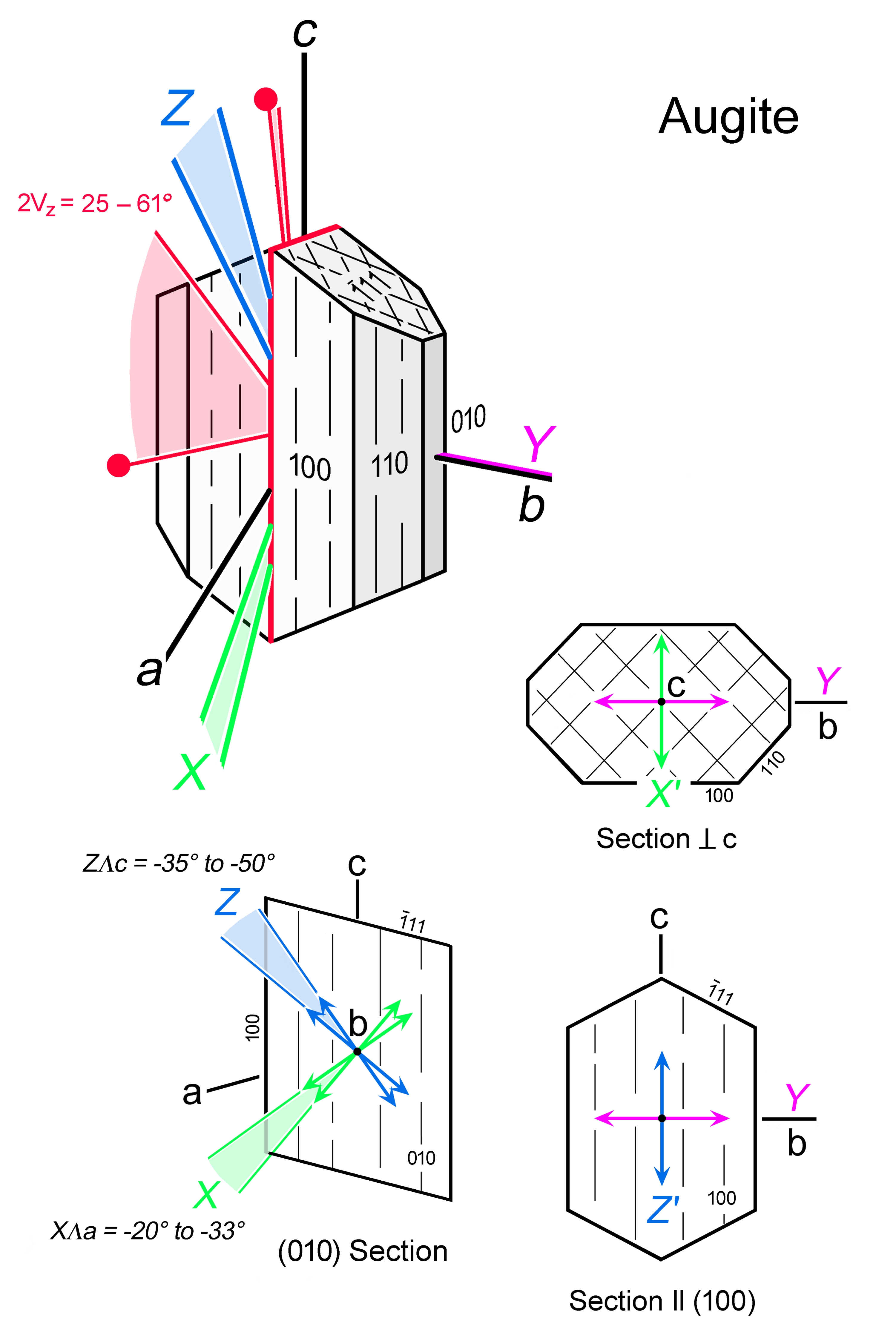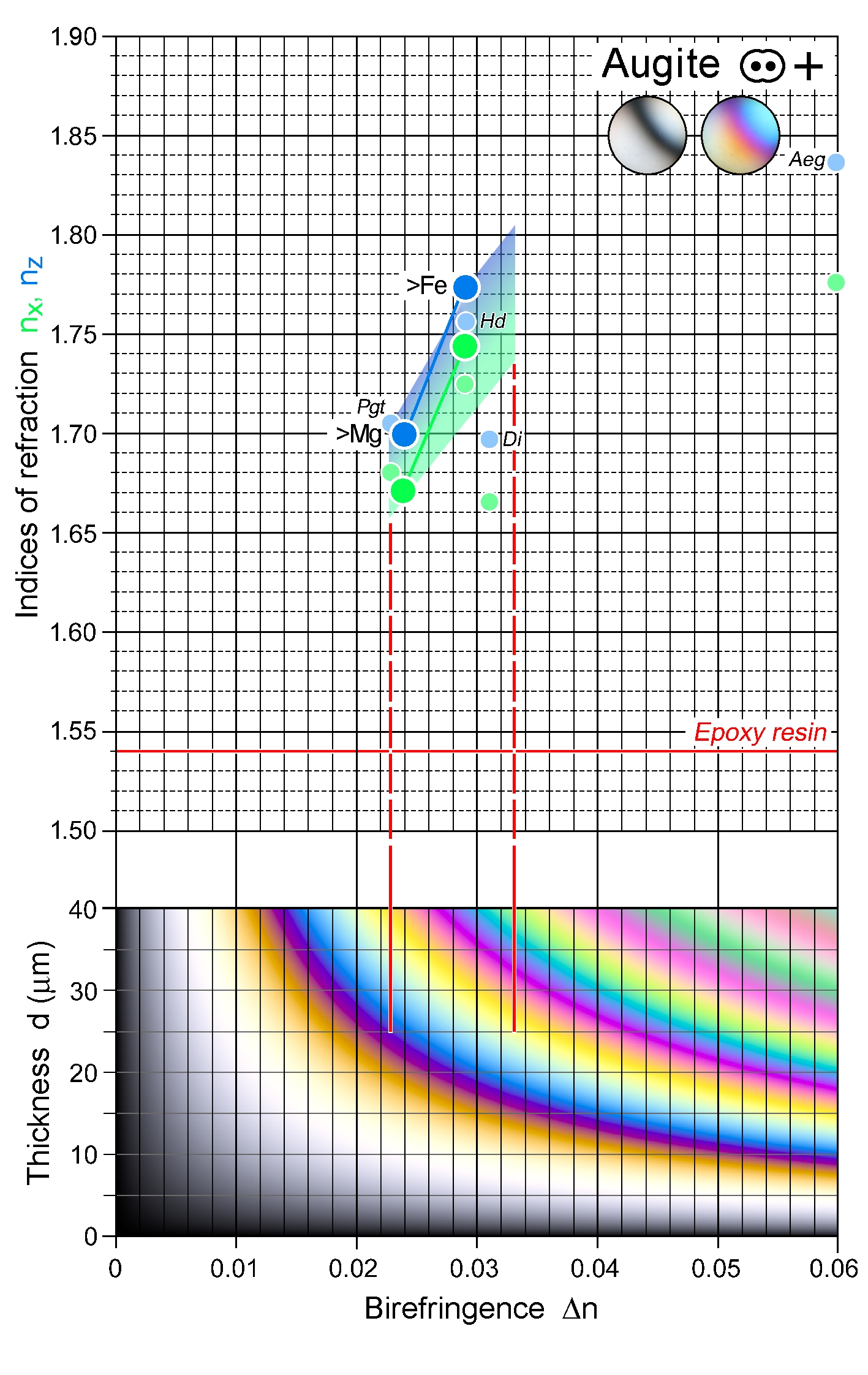|
| Formula | (Ca,Na)(Mg,Fe2+,Fe3+,Al)Si2O6 |
| | Optic class & sign | Biaxial positive |
| | Optical orientation | a near X, b = Y, c at a high angle to Z |
| | Optical plane | (010) |
| | Relief | High |
| | Refractive indices | nx = 1.671 -1.735
|
|
ny = 1.672 -1.741
|
|
nz = 1.703 -1.774
|
|
| n increases with increasing Fe2+, Fe3+, Mn and Ti; n decreases with increasing Al |
| | Birefringence (max.) | 0.018 - 0.033 |
| | | Δn increases with Fe2+, decreases with increasing Al |
| | Optic Angle
| 2Vx
|
| | 2Vz
= 25 - 61° |
| | Sign of elongation | Due to large angle between c and Z, not readily applicable |
| | Interference figure | Sections ⊥ c show off-centre figures with few isochromes |
| | Colour / pleochroism | Colourless to pale green, grey or brown with little to no pleochroism; colour and pleochroism increase with increasing Fe. Titan-augite is distinctly coloured and pleochroic in shades of violet-brown. |
| | Zoning | |
|
|
| Form | Habit | Granular to short-prismatic; also long-prismatic phenocrysts in volcanics; eight- to six-sided sections ⊥ c |
| | | Surface | Anhedral to euhedral |
| | Cleavage | 2 sets {110} distinct, at 93 and 87° (seen in sections ⊥ c); parting on {001} and {100}; parting on (001) may be particularly prominent. In prismatic sections, the traces of the two principal cleavage sets are parallel. |
| | Twinning | Simple or multiple on {100} and {001} |
| | Extinction | Inclined, cɅZ = 35 - 50° in (010) sections; c ∥ cleavage traces and prism faces. In the absence of {001} crystal faces, parting on {001} allows to identify the obtuse angle β within which Z is located. Symmetrical extinction to {110} cleavage and {110} faces in sections ⊥ c. |
|
|
| Reaction textures | Late-magmatic hydration to form hornblende (common in mafic intrusives); metamorphic reactions replacing Ca-pyroxenes by Ca-amphiboles |
| | Alteration / decomposition | Secondary amphiboles (tremolite-actinolite), chlorite, epidote, carbonate |
|
|
| Occurence | Ign | Gabbro, basalt, intermediate igneous rocks, ultramafic rocks; Ti-augite in alkaline volcanic and intrusive rocks |
| | | Met | Mafic granulites |
| | | Sed | |
| | | Hyd | |
| | | Other | |
|
|
| Distinctive properties | Moderate Δn, large extinction angles in maximum birefringence sections, characteristic pyroxene cleavage observed in sections ⊥ c; optical properties similar to the diopside-hedenbergite series. |
| | Additional comments | Unmixing of orthopyroxene lamellae on {100} and of pigeonite on {001} cause parting along these planes. {001} parting surfaces may be decorated with ilmenite platelets. Pigeonite lamellae are prone to convert to orthopyroxene during slow cooling. The combination of simple {100} twins with unmixing on {001} is referred to as ‘herringbone’ structure. |
|
|

 Images
Images 


 Images
Images 
